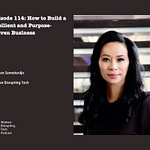Raju Joshi brings more than 30 years of healthcare experience to the table. But it was personal loss that pushed her to build something different.
In our conversation, she shares how Cogensus uses conversational AI to surface early signs of cognitive decline and loneliness. Especially in people who might never say it out loud: “I don’t want to burden my family.”
We also talk about why women are hit harder by these issues, what it takes to build ethical AI that respects agency, and how trust starts with simple design choices.
Whether you're a founder, a caregiver, or just someone navigating aging in your own family, there’s a lot to take away from this episode. Keep reading for the quotes that stuck with me and five practical lessons you don’t want to miss.
Key Takeaways from Episode 112
The World Health Organization estimates that dementia and Alzheimer‑related care cost 1.3 trillion dollars in 2019 and will rise sharply as populations age. So there is a clear business case for what Cogensus is building.
Loneliness and cognitive decline are deeply connected. Raju explains how shrinking social circles and solo living increase cognitive risk. This impacts women disproportionately as they live alone more often, provide 70% of caregiving hours and tend to delay care for themselves.
AI can help address loneliness and cognitive decline with empathy and dignity. Most check-ins ask about mood and medication. Cogensus goes further. It engages individuals in conversation beyond just medical topics, fostering a fuller understanding of their lives and alleviating loneliness.
Cogensus’ solution reaches beyond elder care. In the future, Cogensus can use the same approach for supporting veterans who isolate after service and athletes at risk for concussion‑related dementia.
Raju’s north star is agency: giving people the data they need, at the moment they need it, to stay connected and in control of their lives.
To hear her full story, including her take on inclusion in tech, listen to episode 112 of Women Disrupting Tech on Spotify, Apple Podcasts or YouTube.
Episode Highlights and Timecodes
03:36 Introduction to Raju Joshi and Cogensus
05:47 Personal Motivation Behind Joining Cogensus
09:01 Understanding Cognitive Health and Loneliness
10:45 The Impact of Aging on Health
13:18 Gender Differences in Cognitive Decline
15:25 Delays in Diagnosis and Treatment
17:02 Current Understanding of Cognitive Decline
19:50 Introducing the AI-Enabled Solution
21:47 Insights for Caregivers
24:51 Differentiating from Chatbots and Passive Listening
31:36 Building Trust in AI Conversations
33:42 The Importance of Human Connection
36:20 Building Trust with Technology for Older People
39:13 Personal Experience in Tech Development
41:05 Expanding the Scope of Cogensus
43:05 Understanding CTE and Its Implications
44:52 Addressing Loneliness in Veterans
47:49 AI's Role in Enhancing Human Care
50:33 Balancing Ambition and Community Needs
53:11 Navigating the Funding Landscape
56:51 Encouraging Female Founders
1:00:37 Shifting Mindsets for Inclusion
3 Magic Quotes Defining This Episode
“There is a need for the female perspective in the work that is being created” - Raju Joshi
This episode reframes aging as not just a medical process, but a social one. It’s also a call to rebalance where we invest research, tools, and care. Here are three lines that capture the heart of the conversation. Each one opens a door to a bigger truth:
"People are so much more than the medications that they're on." (27:08)
This quote says in one line what many systems forget. It’s the emotional thesis behind Cogensus. Data that respects the whole person."We want patients to have agency over their own life." (46:22)
One of the most powerful ethical stakes in the episode. Raju makes it clear that tech should support autonomy, not replace it."There is a need for the female perspective in the work that is being created." (54:39)
This quote captures the heart of the episode. It is both a statement of fact and a rallying cry. It reminds us that inclusion isn't just about fairness. It's about better design, better outcomes, and better futures.
What’s your magic moment of the episode? Let me know in the comments.
5 Practical Insights for Building Ethical, Inclusive AI
“We want patients to have agency over their own life” - Raju Joshi
About 33 minutes into our conversation, I start to pick Raju’s brain on how we can build ethical, responsible and inclusive AI solutions for healthcare. If you are designing technology for vulnerable users, these tips from Raju offer a clear roadmap:
Keep usability simple. This is how you build trust, especially with older adults. Raju emphasizes that trust is won through design, not just intention.
Know your use case. Cogensus focuses on cognitive health and loneliness, not general diagnostics. That clarity helps it stay responsible and relevant.
Design for emotional safety. Some people feel more comfortable confiding in a bot than a family member. Don’t dismiss that. Raju’s example of the airplane seat confidant explains this perfectly.
Build for people who are curious, not just tech-savvy. Raju’s father-in-law represents the kind of user often left out. Curious, not fluent, and eager to feel seen.
Give users agency. Good AI doesn’t over-monitor. It listens when asked, and steps back when not needed. Finding that balance is the goal.
Know someone who needs to hear this? Share the episode with them.
My Personal Reflections
The best thing that can happen when you make a podcast is that it gives you tools and inspiration to change your behavior for the positive.
This episode made me look differently at what it means to care for my aging mother. I realized how easy it is to miss the signals when our conversations stay surface-level.
What stuck with me most was how Raju spoke about the emotional blind spots in caregiving and how technology, when used thoughtfully, can help us see them.
Her storytelling also stands out. She brings warmth and clarity through analogies: the airplane seat confidant, the hesitant elder who’ll talk to Siri but not their kids.
And she understands tech trust like few others, naming her 94-year-old father-in-law as someone who’s not tech-savvy but deeply curious. That curiosity, she says, is enough.
In the end, I’m convinced that Raju and her team are building something timely, urgent, and deeply human.
What’s hardest to talk about with someone who’s aging? I’d love to hear your thoughts.
Coming up on Women Disrupting Tech
Next week, we go back to basics: Femke Brouwer exposes how systemic bias in work, home, and education keeps tech unequal. And she calls on men and women to redesign a system that works for everyone.
In this clip, she shares why gender equality in tech and beyond benefits all of us.
So stay tuned for this and much more on Women Disrupting Tech. And until the next episode: Keep Being Awesome!
Dirkjan















Share this post